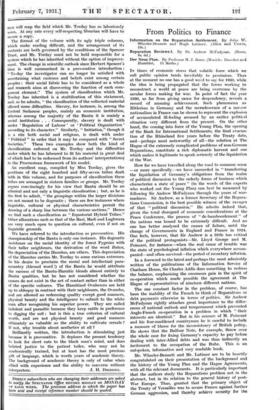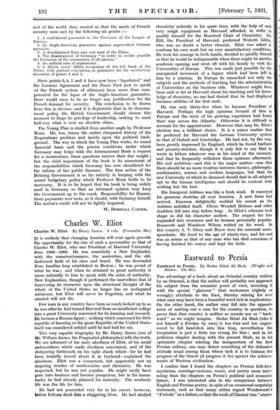From Politics to Fina,nce
Information on the Reparation Settlement. By John W.
Reparation Revlewe J. By Sir Andrew McFadyean. (Bann: 8s. 6d.) IN times of economic stress that volatile force which we call public opinion tends inevitably to pessimism. Thus at the moment no one has a good wo-.41 to say for 1930, while the idea is being propagated that the forces working to reconstruct a world at peace are being overcome by the secular forces making for war. In point of fact the year 1930, so far from giving cause for despondency, reveals a record of amazing achievement. Such phenomena as Hitlerism in Germany and the recrudescence of a narrow nationalism in France can be shown to represent the explosion of accumulated ill-feeling aroused by an earlier political situation very different from the present. On the other hand, the coming into force of the Young Plan, the opening of the Bank for International Settlements, the final evacua- tion of the Rhineland five years before the Treaty date, and—perhaps most noteworthy of all—the solution at The Hague of the extremely complicated problems of non-German Reparations, constitute a rich diplomatic harvest and one which makes it legitimate to speak seriously of the liquidation of the War.
How far we have travelled along the road to common sense —or more specifically—we have succeeded in " transferring the liquidation of Germany's obligations from the realm of political discussion to the orderly forms of business which characterize a state of peace " (in the words of the experts who worked out the Young Plan) can best be measured by following Sir Andrew McFadyean through the years of war- madness. Sir Andrew, as a former Secretary of the Repara- tions Commission, is the best possible witness of the ravages of that " political discussion." He admits indeed that, given the total disregard of economic considerations at the Peace Conference, the process of " de-bamboozlement " of the nations was bound to be extremely difficult. And no one has better analysed the causes of failure, until the change of Governments in England and France in 1924. One feels, however, that Sir Andrew is a little too critical of the political protagonists—Mr. Lloyd George and M. Poincare, for instance—when the real cause of trouble was the state of psychological inflation which everywhere accom- panied—and often survived—the period of monetary inflation.
In a foreword to the latest and perhaps the most admirably written of the publications of the Information Service of Chatham House, Sir Charles Addis does something to redress the balance, emphasizing the enormous gain in the spirit of co-operation which made possible the agreement at The Hague of representatives of nineteen different nations.
The one constant factor in the problem, of course, has been the inability of the French to think of Reparations or debt payments otherwise in terms of politics. Sir Andre' McFadyean rightly attaches great importance to the differ- ences of national outlook and temperament which prevented Anglo-French co-operation in a problem in which " their interests are identical." But in his censure of M. Poincare and his fear-maddened countrymen he is careful to include a measure of blame for the inconsistency of British policy. He shows that the Balfour Note, for example, threw over the whole case for fixing Germany's capacity to pay before dealing with inter-Allied debts and was thus indirectly an incitement to the occupation of the Ruhr. This is an outspoken, informative and very readable book.
Mr. Wheeler-Bennett and Mr. Latimer are to be heartily congratulated on their presentation of the background and the history of the Young Plan and the Hague Agreements, with all the relevant documents. It is particularly important that the authors study the Reparations problem not in the abstract, but in -its relation to the general history of post- War Europe. Thus, granted that the primary object of the Treaty of Versailles was to secure France against further German aggression, and thereby achieve security for the
rest of the world, they remind us that the needs of French security were met by the following six points :—
1. A multilateral guarantee in the Covenant of the League of Nations.
2. An Anglo-American guarantee against unprovoked German egression.
3. A demilitarized Zone east and west of the Rhine.
4. The disarmament of Germany " in order to render possible the limitation of the armaments of all nations."
5. An unfixed sum of reparations. 6. A fifteen years' Allied occupation of the left bank of the Rhine, with gradual evacuation, as guarantee for the satisfactory execution of points 4 and 5.
Since points 3,4, 5 and 6 have now been "liquidated" and the Locarno Agreement and the Peace Pact (not to speak of the French system of alliances) have more than com- pensated for the lapse of the Anglo-American guarantee, there would seem to be no longer any justification for the French demand for security. The conclusion to be drawn from this is obvious, and it is deplorable that in its disarma- ment policy the British Government should choose this moment to forgo its privilege of leadership, seeking to meet half-way what is now an obsolete claim.
The Young Plan is studied from another angle by Professor Bonn. He, too, traces the earlier chequered history of the Reparations problem and insists upon the political back- ground. The way in which the Young Plan works, its sound financial basis and the precise conditions under which Germany may lodge with the International Bank a request for a moratorium, these questions receive their due weight ; but the chief importance of the book is its assessment of the responsibilities which Germany has now shouldered for the reform of her public finances. The firm action of the Briining Goveirnment is so far entirely in keeping with the sound budgetary policy which Professor Bonn holds to be necessary. It is to be hoped that his book is being widely read in Germany so that an informed opinion may keep the Government up to the mark. Responsibility for Repara- tions payments now rests, as it should, with Germany herself. The nation's credit will not be lightly impaired.
W. HORSFALL CARTER.











































 Previous page
Previous page